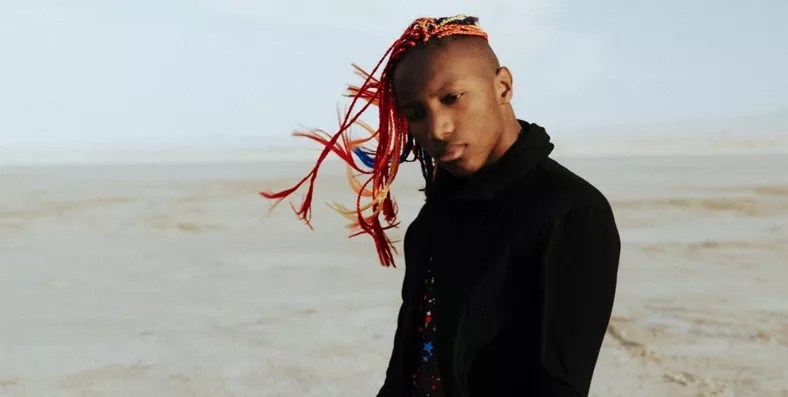
Bandon Densley

Audio By Carbonatix
Omar Davis was sitting in their mom’s car on a Tuesday afternoon as the two scoured the neighborhoods of the greater Los Angeles area to find Davis an apartment. Living in the area will help the electronic-music artist, who performs as Moore Kismet, be closer to studios and collaborators.
The seventeen-year-old musician has already played Lollapalooza, Electric Daisy Carnival Vegas, Tomorrowland in Belgium, Coachella, Bonnaroo, Lollapalooza Paris, HARD Summer and EZoo in New York City. Davis performs with Slander, Virtual Riot, Leotrix and Saka at Red Rocks Amphitheatre on Wednesday, November 9, for one of the last shows of the venerable venue’s season.
The nonbinary artist has been making music since they were about seven years old and plopped down in front of the beatmaking software program Fruity Loops, which was used by many up-and-comers in the EDM world. Davis admits their early music was “super shitty, big room progressive house trance shit.” But once they discovered artists such as Skrillex and Boombox Cartel, they began to fuse those artists’ sounds with trap and future bass. “Then I got into people like Rickyxsan and Hydraulix, people who are really pushing that weirder underground experimental trap sound,” Davis says. “That’s kind of where I gravitated toward.”
Davis adds that electronic music production, which lends itself to sitting around alone for hours on end with a computer, was the perfect match. “I didn’t really have much of a social life,” the artist says. “I never had a band-kid era, so I didn’t fit in super well.”
Mom Taurica Davis has been helpful “since the beginning,” Davis says. “I don’t know if I’d still be doing Moore Kismet if it wasn’t for her continuing to support me.” Davis also took musical influence from their mother, a church-going woman with varied musical tastes: “She listened to gospel music. She listened to hip-hop and R&B, so that was kind of a natural guiding force in what I was doing. It really just kind of meshed over the course of time. They became this strange amalgamation of weird shit that I make now.”
Davis released their debut album, Universe, earlier this year and says the record tells an overall story of accepting yourself and finding love within yourself to share with other people, all in order to make the world a better place.
“It also touches on things like homophobia, bullying, eating disorders, abuse – things no child or human being should have to go through,” they say. “These are things I’ve experienced as I’ve come to terms with myself that I’ve just had to kind of think about and look back on.”
Davis, who is Black and pansexual as well as nonbinary, adds that the concept of love was of particular personal interest, because looking for love isn’t easy, regardless of one’s gender and sexuality. Dating as a “micro celebrity” has been a bit of a nightmare for Davis, because some people have just seen the opportunity to snag a musician without appreciating them as a person.
“You want to find that one person who will be right for you,” they say. “You never really know who that is. That moment just ends up finding itself. I wanted to write songs about thinking you found that person.”
Davis adds that they believe they did a pretty good job telling the stories, because fans have reached out to say they have connected with the message. At least a couple of people have approached Davis to say thank you in person.
“It’s the craziest feeling ever to have people come up and say, ‘Your music has changed my life,’ or ‘You make me happy,’ or ‘I resonate with this song so much,'” Davis says. “I see people in the audience when I’m playing these songs, and they are shouting the lyrics back to me.”
Davis doesn’t quite feel accepted in the EDM world yet, in part because of their young age. Some people still accuse Davis of being “ghost-produced” – in other words, not making their own music. It’s an annoying part of success, and completely untrue.
EDM and the disco that preceded it began as very Black and very queer – music made for places where marginalized people could get together and feel safe. Dance clubs also didn’t require liquor licenses, which police often used as a pretext to raid gay bars and harass patrons. As the years have passed, the culture surrounding the music has become much more white and much more male. Davis adds that they have found support from white or white-passing artists who acknowledge the origin of the music they make. That’s important to Davis, knowing that the history also helps the music continue to grow and evolve. Davis is absolutely floored by some of the music coming from their colleagues.
“There are people who are genuinely trying to make a space for me to help reclaim electronic music as a Black person of color,” Davis says. “That’s what we created as a safe haven. We wanted to share it, because we felt open to sharing it.”
Moore Kismet, 6 p.m. Wednesday, November 9, Red Rocks Amphitheatre, 18300 West Alameda Parkway, Morrison. Tickets start at $45.